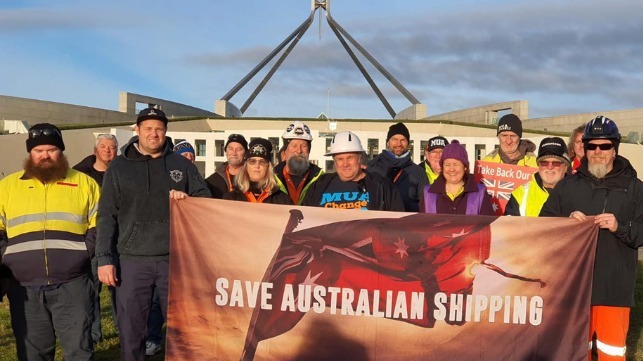Seafarers Protest Loss of Jobs and Ships at Australian Parliament

Similar to many of the developed nations of the world, Australia has seen significant declines in the number of ships registered in the country and the employment of Australian citizens on the ships. The Maritime Union of Australia, joined by others from the maritime industries and politicans, staged a protest outside Parliament House calling on the government to take steps to support the maritime industry. The unemployed seafarers are calling for government investment in a strategic fleet of Australian flagged and crewed vessels to move essential goods between the country’s ports.
“The government hasn’t just stood by and watched the decline of Australian shipping, they have actively approved the replacement of Australian ships with foreign flag vessels crewed by workers paid as little as $2 per hour,” said MUA National Secretary Paddy Crumlin. “Since the coalition government was elected in 2013, we’ve lost half our remaining fleet of Australian cargo vessels, taking with them the jobs of more than 500 Australian seafarers.”
Rally organizers highlighted that while 98 percent of Australia’s imports and exports arrive by sea, only 12 Australian flagged and crewed cargo ships still operate. They pointed out that there are no longer any Australia-flagged oil tankers in service. They pointed out that 30 years ago there were over 100 Australian-flagged vessels in service.
Crumlin said shipping was an essential industry that was the backbone of the nation’s economy, but the federal government was choosing to allow Australian seafarers to be replaced with foreign-flagged vessels. “Many of these vessels work exclusively on the Australian coast, moving cargoes between Australian ports, yet the federal government issues them temporary licenses that allow them to avoid local wages and conditions.”
To emphasize their point, the union highlighted the case of the mv Portland, a vessel that for 27 years carried alumina produced from the bauxite mined in Western Australia to the aluminum smelter in Victoria. In 2015, Alcoa announced that the vessel was being retired and sold, but 10 union members refused to leave the vessel to permit it to sail to Singapore. After two months, they were removed by security guards so that a foreign crew could sail the vessel away from Australia. According to the Maritime Union of Australia, five years later, a foreign vessel under temporary licenses issued by the federal government continues to operate in place of the mv Portland.

that matters most
Get the latest maritime news delivered to your inbox daily.
“This campaign isn’t just about getting Australian seafarers back up the gangways of Australian ships, it’s about the importance of a strong shipping industry to the economic success of an island nation,” said Crumlin.
The Save Australian Shipping campaign has been ongoing for years as jobs in the industry continued to erode. In February 2019, union workers staged a similar protest on the lawn in front of Parliament after 80 Australian seafarers were laid off from two vessels that carried iron ore from Port Hedland in Western Australia to steelworks in Port Kembla. At the time, union leaders said without cabotage laws, the practices of replacing Australians with lower-cost foreign labor were legal and would continue.
